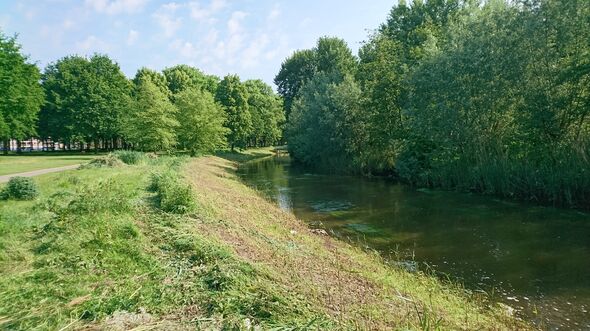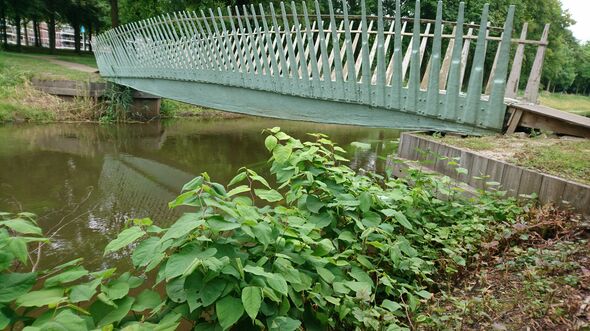Reed-dwelling birds fall prey to aquatic plant eradication in Dommel
Mowing reed in the breeding season; it's not something you would expect of an ecologically managed campus - certainly not when reed warblers have just set up home. Yet last week, quite suddenly, much of the reed in the River Dommel was cut down, as two nature-loving doctoral candidates noticed. The target of the mowing exercise proved to be the floating pennywort, a rampant aquatic plant that the local water board is combating relentlessly.
Robin Doddema and Robbert Willems (both doctoral candidates at Mechanical Engineering) regularly take a turn about the campus looking for interesting animals and plants. During their walks in recent weeks they have heard reed warblers in the reeds on the banks of the River Dommel about level with the Auditorium. On Tuesday May 21st, estimates Willems, as many as four of these little brown reed-dwelling birds could be heard singing their typical rasping song. Naturally their disappointment was great when the next day they found the reed at the site had been largely mowed. “We thought that odd,” he says. “You would expect them to wait until after the breeding season before mowing the reed. Coot nests may also have been destroyed because the mowing was clearly done thoroughly.”
Invasive alien species
Inquiries made to Thijs Mooren of Real Estate Management reveal that the campus is ecologically managed, but that the Dommel, including its vegetation, is the responsibility of the water board of the same name. “We mow only the embankment, and are required to give the water board access to the River Dommel. I understand that they mow in order to control the floating pennywort, an invasive alien species. We ourselves mow only in the fall, and some sections not even every year, to give animals the chance to spend the winter in amongst the greenery. Via Heijmans, who manages our green spaces, we have the ecologist Harold Appelo on hand to advise us on these matters.”
The floating pennywort was indeed what prompted the mowing, Water Board De Dommel informs us through employee Ines van Hees. She believes the water board is currently mowing for the second straight year one side of the Dommel, and is leaving the reed on the other bank intact. Waiting until after the breeding season is not an option because by then the aquatic plant will have spread. “The plant was growing rampantly on the parts of the bank that have now been mown, and had already penetrated deep into the reeds. The water board is trying to control the floating pennywort by removing it by hand. By taking this approach we hope to eradicate this plant completely on this section of the Dommel within a couple of years. Once this alien aquatic plant has been removed we can let the reed grow on both banks.”
Thus this pest control is a matter of necessity and no easy task, as the water board's response makes evident: “The shoots of the floating pennywort can grow as much as 30 centimeters a day. Every piece of plant that floats away establishes itself somewhere else in the Dommel and carries on growing. If we don't control this species, the Dommel will be overgrown in a couple of weeks. It hinders the passage of water and the thick layer stops all light falling into the stream, which causes the loss of plants and fish.”
Rampant growth
So it is a shame for the reed-dwellers but there are more important matters at stake. Willems understands this as well as the next person; he is familiar with the problem of non-native invasive plants. “The Japanese knotweed is another of these rampant species. I know it has been mowed down a couple of times along the banks of the Dommel near the Auditorium when it has gotten really tall. It has already grown back in a couple of places.” The campus is a good spot for birdwatchers and other nature lovers, he stresses. “For the past year Robin and I have been recording all the birds we have seen, and our list already exceeds fifty species. That is more than we expected.”
And the reed warbler? On Thursday morning of last week the tentative song of a solitary bird could be heard fleetingly in the remaining tuft of reed. Perhaps all is not lost.




Discussion